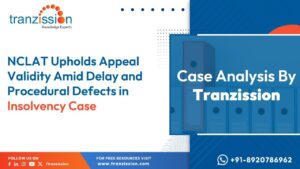
Subjectivity vs. Procedural Integrity: A Critique of the NCLT Order in Indiabulls Housing Finance Ltd. Vs. Dr. Subhash Chandra

Table of Contents
On May 27, 2024, the National Company Law Tribunal (NCLT) issued a significant order in the case of Indiabulls Housing Finance Ltd. Vs. Dr. Subhash Chandra, where the Tribunal decided to replace the Resolution Professional, Mr. Raj Kamal Saraogi, with Mr. Shiv Nandan Sharma. While the order aimed to uphold the integrity of the Insolvency and Bankruptcy Code, a closer examination of the reasoning reveals several points that warrant critique.
The Role of Confidence in the RP
The Tribunal heavily leaned on the Personal Guarantor’s lack of confidence in the Resolution Professional (RP). Confidence and trust are undoubtedly crucial in any fiduciary relationship; however, the reliance placed by the Tribunal on subjective feelings of the guarantor as a decisive factor sets a potentially problematic precedent. The essence of the insolvency resolution process should be grounded in objective criteria and procedural fairness rather than individual sentiments, which can be inherently biased and manipulable.
Conduct of the RP
One of the pivotal reasons for the replacement of the RP was the meeting held at an expensive hotel with a lawyer present, leading to unnecessary costs. The Tribunal found this conduct inappropriate. However, this reasoning raises questions about the expectations placed on RPs. The IBC and its regulations do not explicitly prohibit such meetings, nor do they clearly delineate the appropriateness of venues. The interpretation of the Tribunal here seems to introduce a level of micromanagement that may deter professionals from taking necessary, albeit unconventional, steps to facilitate resolutions. Additionally, the argument that these costs burden the Personal Guarantor fails to consider the holistic context in which such decisions are made and whether these expenses were justified by the complexity of the case.
Absence of Negotiations
The Tribunal criticized the RP for not initiating negotiations between the debtor and creditors. While negotiations are an integral part of the resolution process, the reasoning of the Tribunal overlooks potential practical challenges faced by the RP’s. The absence of negotiations could stem from various factors, including non-cooperation from parties, ongoing assessments, non-finalization of list of creditors or strategic delays. It seems that there is lack of nuanced understanding of the operational hurdles that RPs encounter, thereby simplifying the issue to a procedural fault without considering broader circumstances.
Legal Provisions and the Role of the RP
The order underscores the RP’s role as a consultant and criticizes the involvement of a lawyer in the meeting with the Personal Guarantor. This interpretation of the RP’s role as strictly non-legal and consultative disregards the multi-faceted nature of insolvency cases, which often necessitate legal input to navigate complex regulatory and compliance landscapes. By restricting the RP’s access to legal counsel during crucial interactions, the Tribunal potentially undermines the thoroughness and legal soundness of the resolution process. This order restricts the freedom of the Resolution Professional (RP) to hire an advocate, who is essential for guiding the RP through complex legal matters. Limiting the ability to hire a lawyer infringes on the fundamental right to access legal services and professional advice.
Appointment of the New RP
The appointment of Mr. Shiv Nandan Sharma as the new RP, despite the Personal Guarantor suggesting specific names, was intended to maintain impartiality. However, this decision could be seen as contradictory. On one hand, the Tribunal emphasizes the need for the Personal Guarantor’s confidence in the RP; on the other, it disregards the guarantor’s suggestions for a replacement. This inconsistency highlights a fundamental tension in the Tribunal’s reasoning—balancing subjective comfort with objective procedural integrity.
Replacing the RP Without Allowing a Chance to Respond to the Application
The order fails to indicate that the RP was given an opportunity to respond in writing to the allegations made by the Personal Guarantor. On-the-spot oral submissions cannot replace a detailed written reply. The Tribunal has verbatim cited the grounds and allegations presented in the application, but the RP’s response is conspicuously absent from the record. This omission constitutes a violation of the principles of natural justice, as it denies the RP a fair chance to defend against the accusations. Furthermore, this lack of a proper response undermines the fairness and transparency that are fundamental to judicial proceedings.
Ensuring the Integrity of the Process
While the Tribunal aims to ensure the integrity of the IBC process, the decision to replace the RP based on the outlined reasoning could inadvertently introduce more subjectivity into the process. By prioritizing the Personal Guarantor’s comfort and perceived trust, the Tribunal risks setting a precedent where individual preferences could overshadow procedural fairness and objective evaluation of an RP’s performance.
Conclusion
The order of NCLT in the case of Indiabulls Housing Finance Ltd. Vs. Dr. Subhash Chandra raises important questions about the balance between subjective trust and objective procedural integrity in insolvency cases. While the intention of the Tribunal to uphold the principles encompassed in IBC is clear, the reasoning employed in this decision could have broader implications for the future of insolvency resolution in India. A more balanced approach, considering both the subjective and objective elements, would be essential in refining the process and ensuring that such decisions do not lead to unintended consequences in the long run.






1 Comment
Very crisp analysis of the judgement. The RP is just a scapegoat.